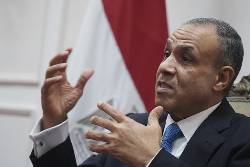NEW ADMINISTRATIVE CAPITAL, Egypt (AP) — Egypt’s chief diplomat on Thursday called on Israel and Hamas to implement a Gaza ceasefire plan “without any delay,” raising pressure on Israeli Prime Minister Benjamin Netanyahu to accept the deal.
Foreign Minister Badr Abdelatty delivered the message at a sensitive time in efforts to end a devastating 15-month conflict. A day after President Joe Biden and other international mediators announced the ceasefire agreement, Netanyahu insisted there still was no deal.
In an exclusive interview with The Associated Press, Abdelatty declined to comment on Netanyahu’s claims that Hamas has “reneged” on certain pledges in the agreement. But he said a deal had been reached thanks to “deep involvement” by American, Qatari and Egyptian mediators, including officials from the incoming administration of President-elect Donald Trump.
“We have a deal. What’s very important is to start implementation,” Abdelatty said from the foreign ministry's headquarters in The New Administrative Capital, a newly built sprawling city about 45 kilometers (28 miles) east of Cairo that houses government offices.
“What we are doing now is to push for final approval and implementation, without any delay.”
Egypt, which has a peace agreement with Israel and shares a border with Hamas-ruled Gaza, has been a key mediator between the enemies for years and a leading player in ongoing ceasefire negotiations.
Cairo is supposed to be the location for continued talks between the U.S., Qatar and Egypt on implementing the deal. Abdelatty said the talks were set to begin soon, and that the mediators would have an “operation room” overseeing the deal in the Egyptian capital.
“We are fully committed to fulfill our own commitments and we are expecting that others to fulfill their own commitments,” he said.
Hamas has suffered heavy losses during the war, but the group appears to remain intact. Its fighters have continued to stage deadly attacks against Israeli troops and its government continues to provide some basic services.
Abdelatty declined to discuss Hamas' capabilities, but signaled it will not play a role in governing Gaza after the war.
He said the internationally recognized Palestinian Authority, which governs from the occupied West Bank after being ousted by Hamas in 2007, is the proper Palestinian entity to lead postwar Gaza.
“We have to empower the Palestinian Authority,” he said, adding that Egypt is ready to work with the U.S. “to empower the Palestinians and the Palestinian police in order to provide security in Gaza.”
He said the only solution to the Israeli-Palestinian conflict is the establishment of an independent Palestinian state that includes the West Bank and Gaza. The outgoing Biden administration has called for a revitalized Palestinian Authority to return to post-war Gaza, an idea Netanyahu and his far-right partners reject.
Under the emerging deal, hundreds of truckloads of desperately needed humanitarian aid are expected to flow into Gaza through Egypt’s Rafah border crossing. The crossing, Gaza’s main gateway to the outside world, has been closed since the Israeli army took over the area last May.
Abdelatty said Egypt aims to open the crossing as soon as possible to allow in 600 trucks a day "because people are starving on the ground.”
He said arrangements are still being worked out, but that Egypt would welcome the return of civilian observers from the European Union.
An EU operation helped run the crossing, in coordination with Israel and the Palestinian Authority, for two years until Hamas seized control of Gaza.
In Brussels, European Commission spokesman Anouar El Anouni confirmed Thursday that the EU is considering a return to the crossing. Egyptian officials said an EU mission is expected in Cairo next week.
“The EU presence would be of great importance,” Abdelatty said.
Egypt has also been harmed by the ongoing war, with seaborne attacks by Houthi rebels in Yemen halting much of the shipping traffic through the Suez Canal.
Abdelatty said Egypt has lost about $600 million in revenue each month as a result of the ongoing tensions. He said the presence of an estimated 10 million refugees and migrants – including tens of thousands of Palestinians from Gaza — has created an additional burden.
“We are not a rich country,” he said.
...


 Copyright © 1996 - 2025 CoreComm Internet Services, Inc. All Rights Reserved. | View our
Copyright © 1996 - 2025 CoreComm Internet Services, Inc. All Rights Reserved. | View our